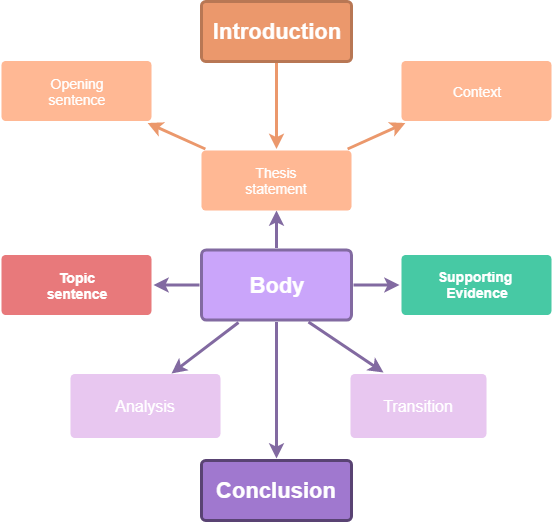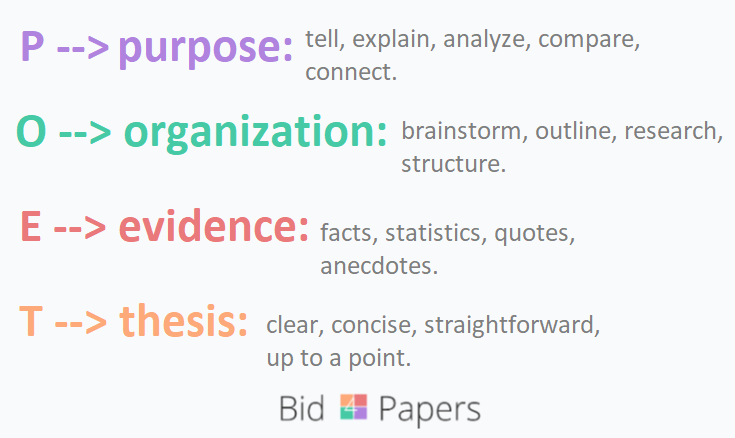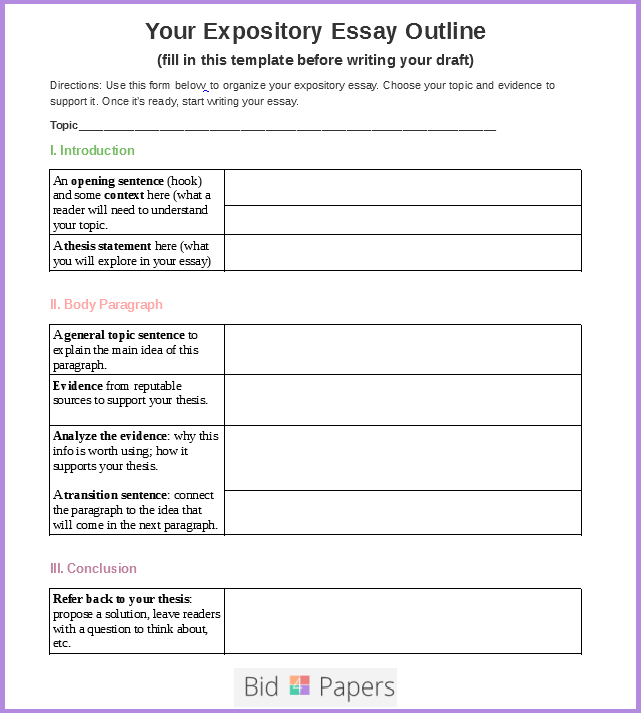What is an Expository Essay? Ultimate Guide
An expository essay is a type of academic writing where you investigate the topic by evaluating the evidence and expounding the idea to describe, explain, and provide the information to a reader.

source: Unsplash
So, it happens again: a teacher assigns an expository essay to you.
Nothing special, right? After all, who doesn’t know anything about expository writing?
*sarcasm here*
Types of essays are so many, and the differences between them are so tiny, that it’s less than simple for a student to get lost in those writing jungles. That’s why Bid4Papers craft the detailed guides for you to find a way out: persuasive essays, narrative essays, SAT essays – they aren’t that terrible if you follow the right path of writing them.
Today, the time is for how to write an expository essay. Take a cup of coffee or tea, sit back, and learn about what is an expository essay and its aspects.
What is an Expository Essay?
When asked to define expository essay, it’s significant to understand the characteristics of this essay type and its difference from argumentative and reflective papers.
Here goes a standard expository essay definition:
An expository essay is a type of paper where an author chooses a topic, investigates it by evaluating the evidence, and expound it to inform readers about it.
So, as you see, the expository definition is not that tricky to remember. The characteristics of your expository essay are as follows:
You write it to teach readers about the topic.
You describe and explain facts on the topic to inform readers.
You provide the exhaustive information on the topic.
You write it in the 3rd person, with a formal language, and in a precise, logical manner.
To write an A-worthy expository essay, you’ll need to do deep research to provide readers with insights on the topic. As an author, you can’t take any side or develop any arguments here: your goal is to inform and explain.
Expository Essay Topics
Expository essay topics can come from different spheres. As a rule, teachers assign a definite topic and give further requirements on writing about it; but if not, students are free to choose from topics of their interest.
You can write about education, health, law, movies, science, politics, social media, wars, history, etc. Just make sure you choose something you know about (it’s easier to research) and can explain it to readers.
Think of topics that might attract your audience and meet the requirements of your teacher. Avoid too general topics; narrow your research sphere, be specific, and make your expository essay clear and concise.
Here go some topic ideas for your inspiration. Feel free to choose any of them if they fit your assignment or ask Bid4Papers writers to assist you.
Elementary
Expository Essay Topics for Beginners
My favorite music is rock: here’s why.
Let’s give better protection to endangered species.
This is my favorite country on Earth, and you should visit it.
These are the benefits of going to the gym.
Why a family is so important to have.
If I could be another person for a day, you’d choose Einstein.
How science helps us live more.
This one thing is what I’d change about my school.
It’s better to live in a city than in the countryside.
Why I want to have a dog, not a cat.

Intermediate
Expository Essay Topics for Intermediates
What I would do if became immortal.
Do people need to be independent?
The #1 secret of every successful person.
Some practical advice to tackle bullying in schools.
The science behind love: how we need to understand this feeling.
Why weight-loss diets don’t work as often as we want.
The banking system is killing economic growth.
The book that has changed my worldview.
How social media help students pass exams.
Emotions help people overcome difficulties.

Advanced
Expository Essay Topics for Intermediates
What makes a great leader and why not everyone can be the one.
Where to invest money after college, and why.
The effect of privacy laws on Internet users.
Minimizing the negative influence of media on our lives.
The reasons of terrorism in modern times.
The best alternative source of energy in the world of climate changes.
Why it’s not dangerous to play video games for hours.
Why do women stay in abusive relationships?
How I cured my depression, and why it can back any time.
Dropping out of college: a choice or a mistake?

Types of Expository Essays
Yes, it’s about types of essays within an expository essay. They are five:
Definition (descriptive) essays: they give information by explaining the meaning of a word or a concept. Here you tell readers about places, situations, or experience concerning the concept.
Classification essays: they break down a broad topic into categories. Here you start an expository essay with the general subject and then define and give examples of each subgroup within it.
Cause/effect essays: they explain the cause of something and how things affect each other within the concept. Here you identify the relations between two subjects, focus on what happened between them, and tell about the effect of that interaction.
Compare/contrast essays: they describe the similarities and differences between two or more concepts, places, people, etc.
Process essays: they explain a step-by-step process of something, its procedure, or how to do it. Your goal here is to give instructions to readers. Sometimes, this type of expository essays is called a problem/solution essay: you describe a problem and then tell readers how to solve it.
So, you can describe, explain, compare, tell about the process, or solve a problem in your essay. But before you choose, make sure you understand what is expository writing and what differs it from persuasive (argumentative) essays.
For many students, these essay types are the same. But it’s not so: while argumentative essays convince readers of your position or point of view, expository essays just tell about the issue and share the facts and evidence about it.
Let’s compare:
The difference between persuasive and expository essays
PersuasiveExpositoryChoose a position/point of view about a topicExplore a topic in a neutral wayPresent your argument in a thesis statementPresent your topic in a thesis statementWrite in the 1st personWrite in the 3d personBe subjectiveBe objective

Expository Essay Structure
Once you’ve decided on the topic and type, it’s time to think of expository essay structure.
As well as all common types of essays, expository ones consist of an introduction, body paragraphs, and a conclusion. Usually, there are three paragraphs in an essay body, but you are welcome to change this number according to your topic and teacher requirements.
An expository essay structure includes:
Logical transitions between all paragraphs.
Factual and logical evidence in body paragraphs.
A conclusion that restates a thesis and readdresses it in the list of provided evidence.
A pinch of creativity to impress readers.
Expository Essay Structure


So, what to write in each part of your expository essay:
Introduction: start it with a general statement about the topic, but do your best to hook the audience so they would like to continue reading; provide the context for the audience to understand your topic; and state a thesis for the audience to understand what you are going to expose in the essay.
Body paragraphs: start with the main idea of the paragraph; include the evidence (facts, statistics, quotes, interviews, etc.) to support the idea; analyze the evidence: explain why you choose this particular information to support your thesis; complete each paragraph with a logical transition to the next one.
Conclusion: overview the ideas you discussed in your essay and highlight the progression of your thoughts on it; restate your thesis and leave readers with food for thought.
How to Write an Expository Essay
An expository essay is about research and informing a reader about an issue, a point of view, or a fact. To get the idea on how to write an expository essay, you need to understand its purpose and follow the steps of academic writing.
The Purpose of Expository Essay
What is the purpose of expository essay?
In plain English, an expository essay explains a topic. You are just stating facts, no matter if you write a “how-to” paper or tell about the history of China or the cost of essays for students.
Such essays are not about what you think about a topic. You inform readers, explaining it through investigation and argumentation in a logical manner.
Use the POET method to organize your expository essay like a boss:

Expository Essay Outline
Before you sit and start an expository essay, write its plan. It’s a kinda map that allows you to specify core elements of your essay and make sure you don’t miss any fact or evidence while writing.
Just write a sentence for each element of your essay to save time and ease the writing process. Feel free to use this expository essay outline template from Bid4Papers:

[Download this template]
Fill it in – and you are ready to start writing your expository essay!
How to Start an Expository Essay
It’s the most common question among students. Frankly speaking, it can lead to a writer’s block and procrastination: you sit, staring at a blank page, and can’t find any words to start a sentence. It frustrates. It upsets. And it disappoints: you give up, postpone, and lose interest in writing…
We wrote about how to start a persuasive essay already. As for how to start an expository essay, the elements of introduction will be the same but with the only difference: you won’t argue about anything. Instead, you’ll be objective about the topic.
And now, for the structure of your introductory paragraph. It consists of:
An attention-grabbing hook: one sentence.
Information about your topic, to give the context to your readers: 2-3 sentences.
A thesis statement: one sentence about what you are going to write about.
Expository Essay Introduction: Structure


TIP: Try writing an introduction after you’ve finished the draft of the essay body. Thus you’ll have all the points and evidence fresh in your mind, and you’ll be able to extract the thesis and decide on the best hook to start an expository essay.
How to End an Expository Essay
Together with an introduction, a strong conclusion is critical for expository essays to have. It ties up the entire essay, wrapping up its thesis for readers and leaving them with thoughts on its topic.

source: Giphy
Think about a minimum of three sentences to write in your conclusion. And remember that you shouldn’t simply restate your thesis here: don’t repeat your thesis statement from the introduction but explain how the information from the essay body helped to come up to this conclusion.
Your essay conclusion is the answer to what you discussed in the essay body. Don’t introduce any new points to readers, and end your expository essay on a positive: give the audience something to remember your essay, and leave them with something to think about.
Points to remember when writing an essay conclusion:
Stay clear.
Conclude the thoughts, not present new ideas.
Restate the thesis and explain how your essay exposes it.
Be objective, use straightforward language.
Make sure it consists of three sentences minimum: sum up (1), answer the questions from your thesis (1-3), give readers the food for thought (1).
Benefits of Expository Writing
That’s all well and good, but…
Why the heck you need to spend time and energy on expository writing?
Nope, it’s not because teachers hate you and want you to get buried in tons of homework. It’s because expository essays help you develop some valuable skills you’ll need in the years since school is over. Below are the benefits you gain:
Research and evaluating the information: In the Internet era, when tons of information is online, and it’s hard to understand what’s true or false, this skill is more than crucial to have. Expository essays are about research, so the more you do it, the more skillful you become. You learn to evaluate the information, check if it’s relevant and trustful, and understand what’s fake online.
Critical thinking: In expository essays, you often need to evaluate the issue and approach to it from different angles. It develops your critical thinking, a must-have skill for each representative of Gen Z to have today.
Ability to express your thoughts briefly and clearly: You need to gather tons of information for your expository essay but stay coherent when describing it. Thus you learn to express yourself and share your thoughts with others.
Time management and organizational skills: Expository writing teaches you to organize thoughts and express them logically. It’s all about organizational skills we all need to develop and improve in adult life. Practice makes perfect, so you’ll learn how to manage time and organize your tasks. Not bad, huh?
The Process of Expository Writing
When writing an expository essay, you’ll follow at least four steps: prewriting (brainstorming, research, outlining), drafting (writing an introduction, a body, and a conclusion of your essay), revising (checking all factual and grammar/spelling mistakes), and editing.
Yes, the process seems energy-sapping. But nothing is as bad as it looks.

Here it goes, the process of your expository writing:
Step 1 – Prewriting
This phase is when you brainstorm a topic (if a teacher didn’t assign it beforehand), state a thesis, and do research to outline an expository essay before writing it.
How to choose the best topic for your expository essay?
Think of niches you already know something about. Make a list of topics that might be interesting for you, and you feel you might tell about to readers. Then, narrow it down to one that would be easiest for you to find research.
When choosing, answer these questions:
Is it interesting to you?
Do you have any previous knowledge about this topic?
Is it easy to find credible references for it?
Can you explain this topic (issue) to the reader?
Once the topic is ready, it’s time for research. Don’t skip this step, even if you think you know a lot about the topic of your expository essay: you’ll need references anyway; plus, you’ll learn more details and discover new things about your topic to include to your writing.
You need research to find examples for your essay, know what you will write in every paragraph, and state a thesis.
What’s a thesis?
It’s the heart of your essay, and no teacher will grade your paper high if it doesn’t have any thesis statement inside. In short, it’s a sentence in the introduction of your essay that identifies the main idea or a central purpose of your text.
For most students, a thesis is the most challenging part of an essay to write. That’s why so many free essay generators are online now, and that’s why thesis statement generators are so popular. Feel free to try ours:

source: Giphy
NB! A thesis is not a mere fact or statement. It’s a claim, an idea, or an interpretation one can dispute. Your job as an essay writer is to give readers something they could think about.
Example:Bad thesis: British indifference caused the American Revolution.
Good thesis: By treating their U.S. colonies as little more than a source of revenue and limiting colonists’ political rights, British indifference contributed to the start of the American Revolution. (Source)
Write down a thesis statement to the outline, with the researched info and examples. Now you are ready to start drafting.
Step 2 – Drafting
When the thesis and outline are ready, start writing your essay. Drafting each paragraph, refer to the thesis statement so you wouldn’t miss any points. Use transition words in every paragraph to reinforce the message, support facts, and make it easier for readers to follow your train of thoughts.
Start each body paragraph with a topic sentence to introduce what it will be about. Develop the idea and present the evidence in every paragraph
Tips for writing body paragraphs of your expository essay:
Provide facts that will help readers get to the point.
Avoid biased information, use straightforward language: short and clear words, active verbs, and appropriate adverbs.
Choose evidence that would be the most telling example for your thesis.
Step 3 – Revising
This is a phase when you review your draft and reorganize, if necessary, for it to look and sound better.
What to check when revising your expository essay:
Revising Your Expository Essay: Questions to Answer
■ Does it give an unbiased analysis of facts and examples?
■ Do you communicate the information logically and clearly?
■ Are there any unnecessary details you could omit for the essay to sound more focused?
■ Are all sentences clear?
■ Is the word choice precise?
■ Do you use logical transitions between sentences and paragraphs for readers to understand the information better?
■ Do you restate the thesis and supporting ideas in the concluding paragraph of your essay?

Step 4 – Editing
The final step of writing an expository essay is its editing. Read it once again to check for grammar and spelling mistakes, improve its style and clarity, and make sure it’s engaging for readers to check.
You can ask a friend to read your essay and share advice on its editing.
You can read the essay out loud: this trick helps to identify phrases and grammar constructions that sound weird.
You can try some online tools to check the grammar and spelling of your expository essay: Hemingway App, Grammarly, After the Deadline, Ginger, and others.
You can ask a professional editor to check your essay and give feedback on what to improve there.
And only after you are 100% sure the essay looks great, submit it for a teacher’s review and wait for your A+.
Writing Tips to Follow
For expository essays, you need to investigate a topic inside out and report the facts, regardless of what you think about them. Follow these expository essay tips – and your paper will rock!
Think about an eye-catching headline for your essay, but make sure it has something to do with your thesis statement.
Research your topic, even if you think you know it well.
Use reputable resources for evidence and references: studies, academic journals, educational resources, official figures, etc.
Inform, share facts, but avoid writing about what you think about the topic.
Use clear and concise language, avoid biased information.
Organize facts logically, so it would be easier for readers to follow the information.
Write in the 3rd person. If describing a process or an activity, the 2nd person is okay to use too.
Avoid vague language, prioritize quality over quantity: introduce top facts and evidence only.
Write sentences of different length for better rhythm.
Use transition words to move between paragraphs.
Write your first draft a few days before the deadline, and wait a day or two before revising and editing it. Thus you’ll have a chance to look at your writing from a fresh perspective.
Read your expository essay out loud to notice its weak points or strange grammar constructions to revise.
Ask a friend to read your essay and tell if you need to edit something.
And last but not least:
Remember about the difference between argumentative and expository essays. Don’t persuade readers of your opinion. Tell about the topic, share facts and evidence, and let readers be the judge of that.
Expository Essay Examples
Are there any examples of what a great expository essay looks? Samples are many, and you’ll have no difficulty to find them in Google.
But remember:
All those expository essay examples are for assistance purposes only. You can’t take and copy them to use in own papers. After all, you know what happens to students who plagiarize in academia and infringe copyrights, don’t you?
https://bid4papers.com/blog/expository-essay/
Comments
Post a Comment